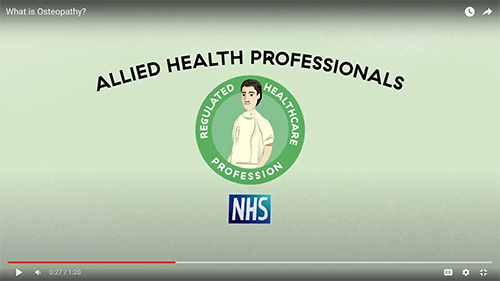Osteopathy is one of 15 Allied Health Professions (AHPs) recognised by the NHS in England. To mark Allied Health Professions Day, we take a look at the important role AHPs play in supporting and managing the health and wellbeing of the UK population.
What are Allied Health Professions?
The Allied Health Professions play a crucial role in helping patients live their lives as fully as possible, and include physiotherapists, osteopaths, paramedics, art therapists, dietitians, occupational therapists, chiropodists and podiatrists, music therapists, orthoptists, operating department practitioners, prosthetists and orthotists, diagnostic and therapeutic radiographers, and speech and language therapists.
Together, they form the third largest workforce within the NHS*, although many – including osteopaths – also operate in private practice.
Each of the AHPs are regulated (in the case of osteopathy by the General Osteopathic Council), and require significant training and ongoing Continuing Professional Development (CPD) to ensure excellent standards of care for patients.
To find out more about osteopathy watch our short video:

Why are Allied Health Professions important?
Allied Health Professions are primarily concerned with managing and improving health and wellbeing so that their patients can live full and active lives, from birth to end-of-life. They play a vital role in preventative and rehabilitative care; helping patients manage their own health and supporting their recovery in the event of injury or illness. They have the potential to improve the healthcare that patients receive, to minimise the need for more significant medical interventions in the future, and to reduce pressure on the UK’s healthcare system.
AHPs also help to educate and empower patients, giving individuals greater control over their own health and wellbeing.
What are the opportunities for Allied Health Professionals?
Allied Health Professionals are employed widely within the NHS, and although osteopaths are currently under-represented in the NHS workforce opportunities are increasing.
AHPs may also choose to work in private practice and this is the case for many osteopaths, as it offers them the flexibility to determine their own working patterns and shape their practice around their personal interests and circumstances. It also provides direct access for patients looking to maintain their general health and wellbeing throughout their lifetime.
For more information about opportunities for AHPs within the NHS visit the NHS Health Careers website.
For an idea of the different career paths available to osteopaths watch our short video:

Osteopaths may be able to help with a number of short-term or chronic conditions including:
General aches and pains
Back, shoulder or neck pain
Sports injuries
Arthritis or joint pains
Headaches or migraines
Digestive or abdominal issues
Sciatica
If you would like to make an appointment at our osteopathic clinic to see if we can help contact us on 020 7089 5360 or email clinicappointments@uco.ac.uk.
Interested in finding out more about osteopathy and a career as an AHP? Sign up to an open day or contact us at admissions@uco.ac.uk.

